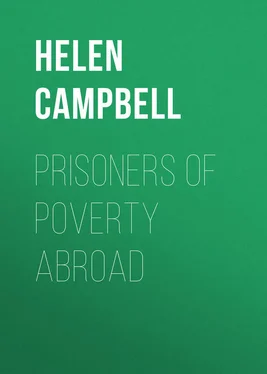Helen Campbell - Prisoners of Poverty Abroad
Здесь есть возможность читать онлайн «Helen Campbell - Prisoners of Poverty Abroad» — ознакомительный отрывок электронной книги совершенно бесплатно, а после прочтения отрывка купить полную версию. В некоторых случаях можно слушать аудио, скачать через торрент в формате fb2 и присутствует краткое содержание. Жанр: foreign_antique, foreign_prose, на английском языке. Описание произведения, (предисловие) а так же отзывы посетителей доступны на портале библиотеки ЛибКат.
- Название:Prisoners of Poverty Abroad
- Автор:
- Жанр:
- Год:неизвестен
- ISBN:нет данных
- Рейтинг книги:3 / 5. Голосов: 1
-
Избранное:Добавить в избранное
- Отзывы:
-
Ваша оценка:
- 60
- 1
- 2
- 3
- 4
- 5
Prisoners of Poverty Abroad: краткое содержание, описание и аннотация
Предлагаем к чтению аннотацию, описание, краткое содержание или предисловие (зависит от того, что написал сам автор книги «Prisoners of Poverty Abroad»). Если вы не нашли необходимую информацию о книге — напишите в комментариях, мы постараемся отыскать её.
Prisoners of Poverty Abroad — читать онлайн ознакомительный отрывок
Ниже представлен текст книги, разбитый по страницам. Система сохранения места последней прочитанной страницы, позволяет с удобством читать онлайн бесплатно книгу «Prisoners of Poverty Abroad», без необходимости каждый раз заново искать на чём Вы остановились. Поставьте закладку, и сможете в любой момент перейти на страницу, на которой закончили чтение.
Интервал:
Закладка:
CHAPTER V.
CHILD OF THE EAST END
"What is it to be a lady?" The voice was the voice of a small and exceedingly grimy child, who held in her arms one still smaller and even grimier, known to the neighborhood as "Wemock's Orlando." Under ordinary circumstances, neither Wemock's nor anybody's youngest could have excited the least attention in Tower Hamlets where every doorway and passage swarms with children. But Orlando had the proud distinction of having spent three months of his short life in hospital, "summat wrong with his inside" having resulted from the kick of a drunken father who objected to the sight or sound of the children he had brought into the world, these at present numbering but seven, four having been mercifully removed from further dispensation of strap and fist and heavy boot.
Such sympathy as the over-worked drudges who constituted the wives of the neighborhood had to spare, had concentrated on Orlando, whose "inside" still continued wrong, and who, though almost three, had never been able to bear his weight on his feet, but became livid at once, if the experiment was tried, – a fact of perennial interest to the entire alley.
Wemock's fury at this state of things was something indescribable. A "casual" at the Docks, with the uncertainty of work which is the destruction of the casual laborer, he regarded the children as simply a species of investment, slow of making any return, but certain in the end. Up to five, say, they must be fed and housed somehow, but from five on a boy of any spirit ought to begin a career as mud-lark to graduate from it in time into anything for which this foundation had fitted him. The girls were less available, and he blessed his stars that there were but three, and cursed them as he reflected that Polly was tied hand and foot to Orlando, who persisted in living, and equally persisted in clinging to Polly, who mothered him more thoroughly than any previous Wemock had been.
Not that the actual mother had not some gleams of tenderness, at least for the babies. But life weighed heavily against any demonstration. She was simply a beast of burden, patient, and making small complaint, and adding to the intermittent family income in any way she could, – charing, tailoring, or sack-making when the machine was not in pawn, and standing in deadly terror of Wemock's fist. The casual, like most of the lower order of laborers, has small opinion of women as a class, and meets any remonstrance from them as to his habits with an unvarying formula.
"I'm yer 'usban', ain't I?" is the reply to request or objection alike, and "husband" by the casual is defined as "a man with a right to knock his woman down when he likes." This simplifies responsibility, and, being accepted with little or no question by the women, allows great latitude of action.
Wemock had learned that the strap was safer than a knock-down, however, as a dose of it overnight did not hinder his wife from crawling out of bed to prepare the breakfast and get to work, whereas a kick such as he preferred, had been known to disable her for a week, with inconvenient results as to his own dinners and suppers.
"It's the liquor as does it. 'E's peaceable enough when the liquor's out of 'im. But their 'ands comes so 'eavy. They don't know how 'eavy their 'ands comes." Thus Mrs. Wemock, standing in the doorway, for the moment holding Orlando, who resented his transfer with a subdued howl of grief, and looked anxiously down the alley toward Polly's retreating figure.
"'Ush now an' ma'll give him a winkle. Polly's gone for winkles. It's winkles we'll 'ave for supper, and a blessing it's there's one thing cheap and with some taste to it. A penny-'orth even, goes quite a way, but a penny-'orth ain't much when there's a child to each winkle an' may be two."
"The churchyard's been a better friend to me than to you," said a thin and haggard-looking woman, who had come across the street for a look at Orlando. "Out of my seventeen, there ain't but six left an' one o' them is in the Colonies. There's small call to wish 'em alive, when there's nought but sorrow ahead. If we was ladies I suppose it might all be different."
It was at this point that Polly's question was heard, – Polly, who had rushed back with the winkles and put the dish into her mother's hand and caught Orlando as if she had been separated from him hours instead of minutes. And Orlando in turn put his skinny little arms about her neck. Whatever might be wrong with his inside, the malady had not reached his heart, which beat only for Polly, his great dark eyes, hollow with suffering, fixing themselves on her face with a sort of adoration.
"A lady?" Mrs. Wemock said reflectively, eying her winkles, "there's more than one kind, Polly. A lady's mostly one that has nought to do but what she likes, and goes in a carriage for fear she'll soil her feet. But I've seen real ladies that thought on the poor, and was in and out among 'em. That kind is 'ard to find, Polly. I never knew but two an' they're both dead. It's them as has money, that's ladies, and them that hasn't – why they isn't."
"Then I can't be a lady," said Polly. "I heard Nelly Anderson say she meant to be a lady."
"Lord keep you from that kind!" said the mother hastily, with a significant look at her neighbor, which Polly did not fail to note and puzzle over. Tending Orlando gave her much time for puzzling. She was known as an "old fashioned" child, with ways quite her own, always to be depended upon, and confiding in no one but Orlando, who answered her in a language of his own.
"When I am a lady, we will go away somewhere together," Polly said. "I think I shall be a lady sometime, Orlando, and then we'll have good times. There are good times somewhere, only they don't get into the Buildings," and with a look at the sooty walls and the dirty passage she followed her mother slowly up the stairs, and took her three winkles and the big slice of bread and dripping, which she and Orlando were to share, into the corner. Orlando must be coaxed to eat, which was always a work of time, and before her own share had been swallowed, her father's step was on the stairs, and her mother turned round from the machine.
"Keep out of the way, Polly. 'E's taken too much, I know by the step of 'im, and 'e won't 'alf know what he's about."
Polly shrunk back. There was no time to get under the bed, which she often did, and she hugged Orlando close and waited fearfully. Both were silent, but she put her bread behind her. To see them eating sometimes enraged him, and he had been known to fling loaf and teapot both from the windows.
Both were on the table now, two or three slices spread with dripping for the younger boys who would presently come in. Wemock sat down, his hands in his pockets and his legs stretched out to their utmost length, and looked first at his wife who was stitching trousers, and then at Polly, whose eyes were fixed upon him.
"I'll teach you to look at me like that, you brat," he said, rising slowly.
"For the Lord's sake, Wemock!" his wife cried, for there was deeper mischief than usual in his tone. "Remember what you did to Orlando."
"I'll do for him again. I've 'ad enough of him always hunder foot. Out o' the way, you fool."
Polly looked toward the door. A beating for herself could be taken, but never for Orlando. Her mother had come between, and she saw her father strike her heavily, and then push her into the chair.
"Go on with your trousers," he said. "There's no money at the Docks, and these children eating me out of house and home. A man might be master of his own. Come 'ere. You won't, won't you? Then – "
There were oaths and a shriek from Orlando, on whom the strap had fallen; and then Polly, still holding him, rushed for the door, only to be caught back and held, while the heavy fist came down with cruel weight.
Читать дальшеИнтервал:
Закладка:
Похожие книги на «Prisoners of Poverty Abroad»
Представляем Вашему вниманию похожие книги на «Prisoners of Poverty Abroad» списком для выбора. Мы отобрали схожую по названию и смыслу литературу в надежде предоставить читателям больше вариантов отыскать новые, интересные, ещё непрочитанные произведения.
Обсуждение, отзывы о книге «Prisoners of Poverty Abroad» и просто собственные мнения читателей. Оставьте ваши комментарии, напишите, что Вы думаете о произведении, его смысле или главных героях. Укажите что конкретно понравилось, а что нет, и почему Вы так считаете.












